

7 Places Where Emotional Support Dogs Are Allowed
by Lena Park
Last updated: August 3, 2025
Verified and Approved by:
Angela Morris,
MSW, LCSW
Fact Checked

Overview
Emotional support dogs play a crucial role in the lives of many individuals, offering companionship and comfort in times of need. These beloved animals are permitted in various settings, such as rental housing and certain airlines, as long as owners possess valid ESA letters that adhere to legal regulations. It’s essential to understand your rights under the Fair Housing Act and the Air Carrier Access Act, which protect you as a tenant or traveler, allowing you to keep your emotional support dog in pet-restricted accommodations and during travel, despite the differing policies that may exist.
Navigating the challenges of mental health can be overwhelming, and the presence of an emotional support dog can make a significant difference. These animals provide not only companionship but also a sense of security and stability. With an ESA letter, you can ensure that your furry friend is by your side, offering the support you need in various situations.
As you reflect on your own experiences, consider how an emotional support dog could enhance your well-being. The bond you share with your ESA can be a source of comfort during difficult times, reminding you that you are not alone in your journey.
In conclusion, understanding your rights and the benefits of having an emotional support dog can empower you. With the proper documentation, you can navigate housing and travel with the reassurance that your emotional support companion is there to help you through life’s challenges.
Introduction
Navigating the complexities of emotional support dogs can feel overwhelming for many individuals who seek comfort and companionship in their lives. It’s essential to understand where these beloved animals are allowed—whether in housing, public spaces, or during travel—as this knowledge plays a crucial role in ensuring their owners can access the support they so desperately need.
However, this journey is often fraught with challenges, from varying regulations to the necessity of proper documentation. Many may wonder: what are the specific rights and limitations surrounding emotional support dogs in different environments?
This article aims to delve into the essential places where emotional support dogs are permitted, shedding light on the rights of their owners and the necessary steps to advocate for their cherished companions.
Wellness Wag: Quick ESA Letter Services for Housing and Travel
Navigating mental health challenges can be overwhelming, leaving many feeling isolated and in need of support. Wellness Wag understands these struggles and provides a streamlined and efficient process for obtaining Emotional Support Animal (ESA) letters, which are vital for individuals seeking therapeutic companionship.
The journey begins with a brief assessment to determine eligibility, followed by compassionate consultations with licensed physicians who evaluate the client’s specific needs. Once approved, clients receive their official ESA letter within 24 hours, a notably faster turnaround than the average 2-3 business days offered by other providers. This rapid response is especially crucial for those facing immediate mental health challenges and inquiring about where emotional support dogs are allowed in housing or travel situations.
Research shows that spending just ten minutes with an ESA can lower cortisol levels, significantly improving overall well-being. Furthermore, during the pandemic, 62% of ESA owners reported enhanced mental well-being, underscoring the essential role these animals play in providing comfort and assistance.
Mental health professionals, like Marie Pietri, affirm that “ESAs help people feel less lonely and more emotionally balanced,” highlighting the importance of timely access to ESA letters for those in need. To further reinforce customer satisfaction and confidence in their services, Wellness Wag also offers a money-back guarantee, ensuring that support is always within reach.
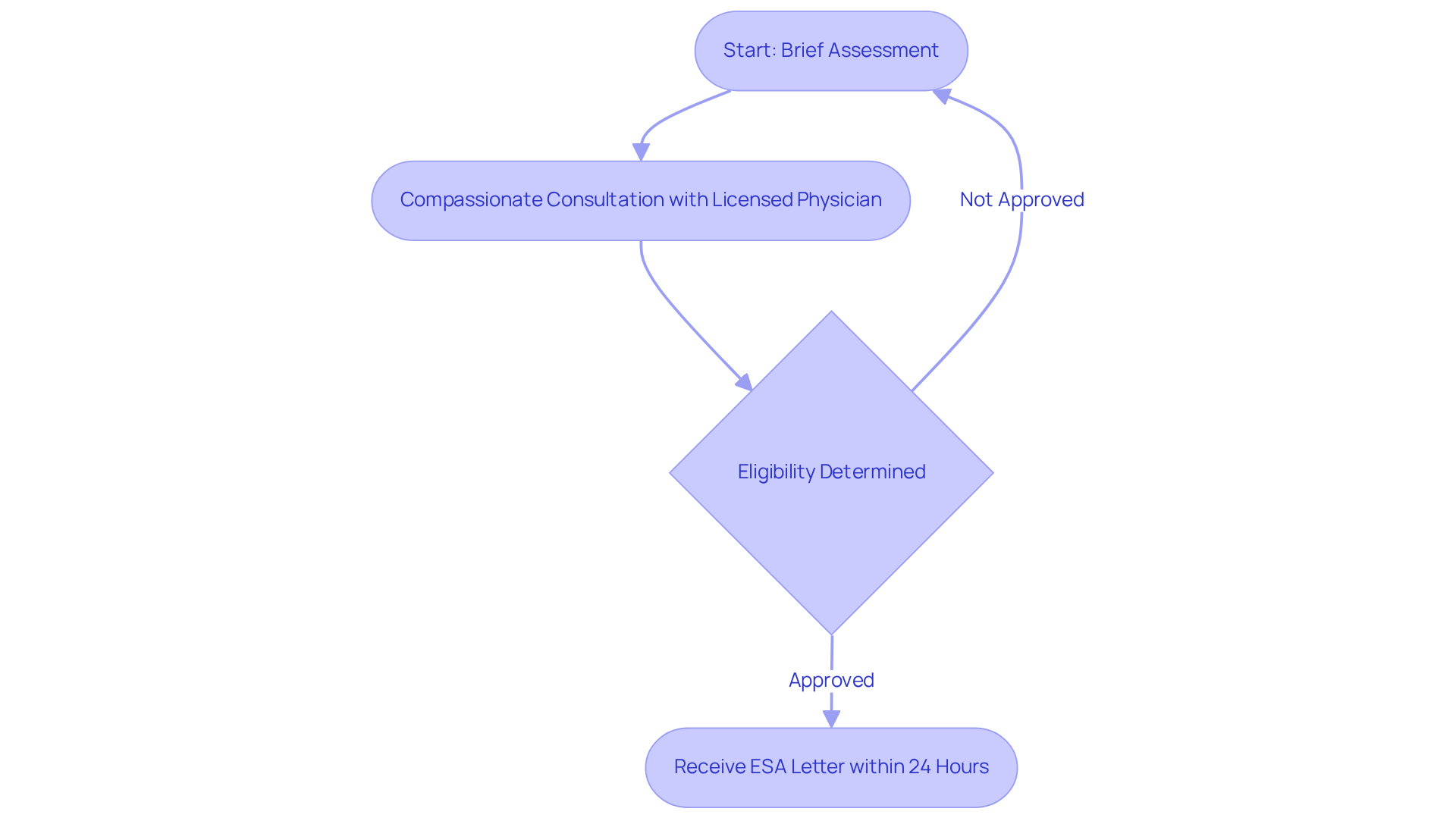
Fair Housing Act: Rights for Emotional Support Dogs in Rentals
Under the Fair Housing Act (FHA), tenants with assistance dogs are granted specific rights that protect their ability to live with their beloved pets in rental properties, highlighting the importance of knowing where emotional support dogs are allowed. It’s important to understand where emotional support dogs are allowed, as landlords cannot refuse housing solely based on the presence of an assistance animal if the tenant presents a valid ESA letter from a licensed mental health professional. This legal framework is vital for individuals facing mental health challenges, as it clarifies where emotional support dogs are allowed to reside in pet-restricted accommodations without the fear of discrimination.
Many individuals struggle with mental health issues, raising the question of where emotional support dogs are allowed, as recent statistics reveal that approximately 18% of pet owners in the U.S. have emotional support companions. This number continues to rise as awareness of the mental health benefits of these animals grows. Research by Judith Hoy-Gerlach and others has shown that ESA companionship can significantly alleviate feelings of depression and anxiety, highlighting the essential role these animals play in managing mental health conditions. It’s crucial for tenants to be informed about their rights under the FHA, especially regarding where emotional support dogs are allowed, as it requires landlords to engage in good-faith discussions about ESA requests and prohibits them from imposing additional fees or deposits for these animals.
Advocacy for ESA rights is essential, especially in situations where landlords may be resistant to clarifying where emotional support dogs are allowed. Tenants can advocate for their rights effectively by presenting their ESA letters and engaging in constructive conversations with their landlords. If a landlord unjustly denies an ESA request, tenants can inquire where emotional support dogs are allowed by filing complaints with the U.S. Department of Housing and Urban Development (HUD), which has the authority to investigate claims of discrimination. The complaint process involves submitting a complaint form and providing supporting documentation, with HUD reviewing the case to determine if it falls under the FHA.
Understanding these rights not only empowers tenants but also underscores the significance of psychological support systems in addressing mental health issues. With over 50,000 patients served, platforms like Wellness Wag play a crucial role in facilitating access to valid ESA letters, ensuring that individuals can advocate effectively for their rights in rental situations. Remember, you are not alone in this journey, and there are resources available to support you every step of the way.
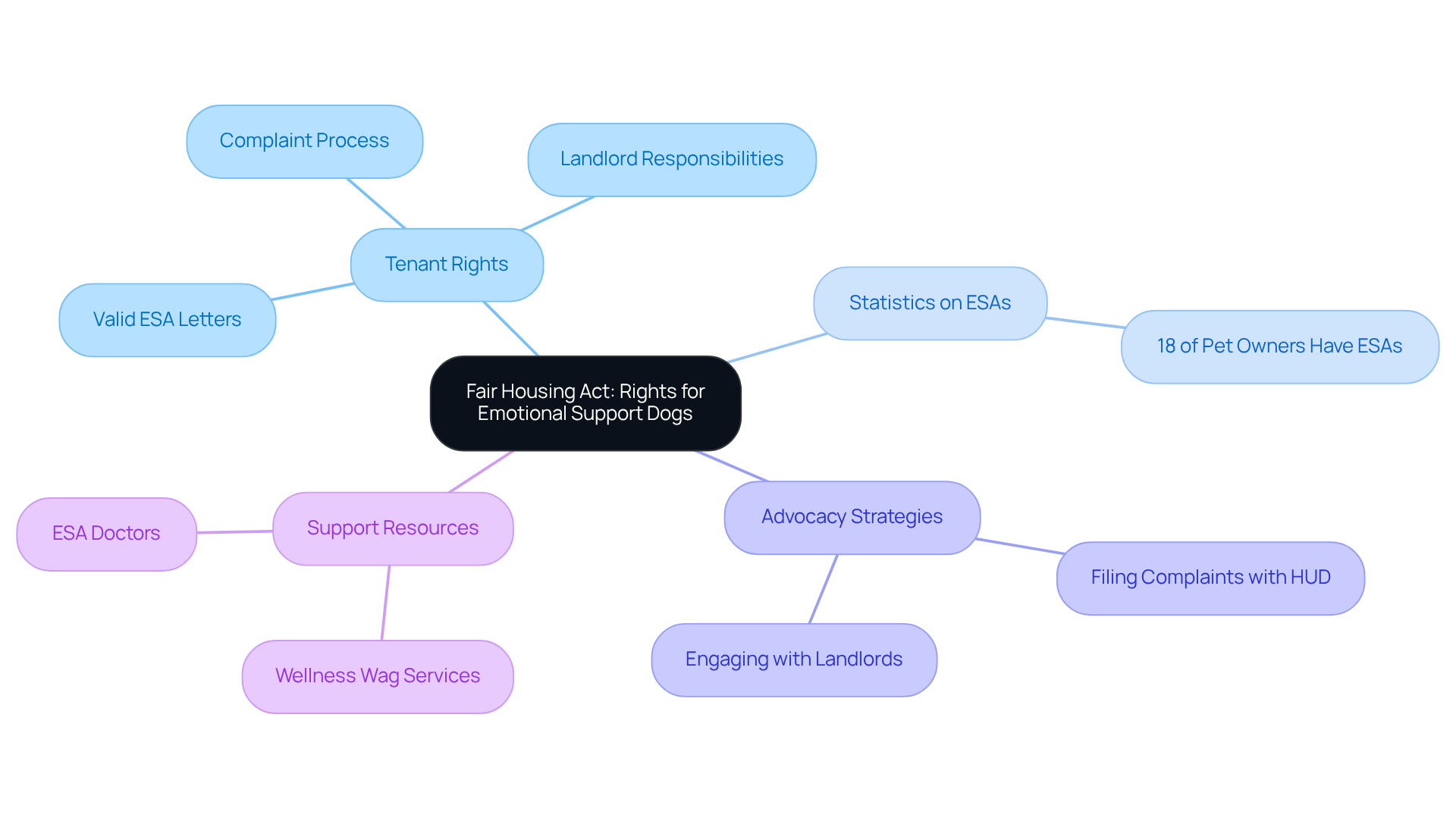
Air Carrier Access Act: Traveling with Emotional Support Dogs
Traveling with assistance dogs can be a deeply fulfilling experience, yet understanding the regulations related to the Air Carrier Access Act (ACAA) is essential for a smooth journey. Many individuals with therapeutic assistance dogs face emotional challenges, especially with the recent changes in airline policies. The ACAA allows these individuals to fly on commercial airlines, provided they present a valid ESA letter. However, as of 2021, airlines are no longer mandated to accommodate therapy animals as they once did. This shift means that many airlines now treat ESAs similarly to pets, often imposing standard pet fees and specific documentation requirements.
As April Brightman notes, “The act once safeguarded assistance animals enabling them to travel on airlines without cost but was revised in 2021.” This change highlights the importance of verifying individual airline policies before booking flights, ensuring compliance and a smoother travel experience. It can be disheartening to learn that around 30% of airlines still allow comfort dogs, but this varies significantly, making prior arrangements crucial.
To prepare for traveling with an assistance dog, it’s vital for passengers to reach out to their airline ahead of time to confirm documentation needs and any particular policies. Successful travel experiences often hinge on clear communication with airline representatives about ESA travel policies, ensuring that both the owner and their assistance dog can navigate the journey comfortably. Remember, you are not alone in this process; support is available to help you every step of the way.
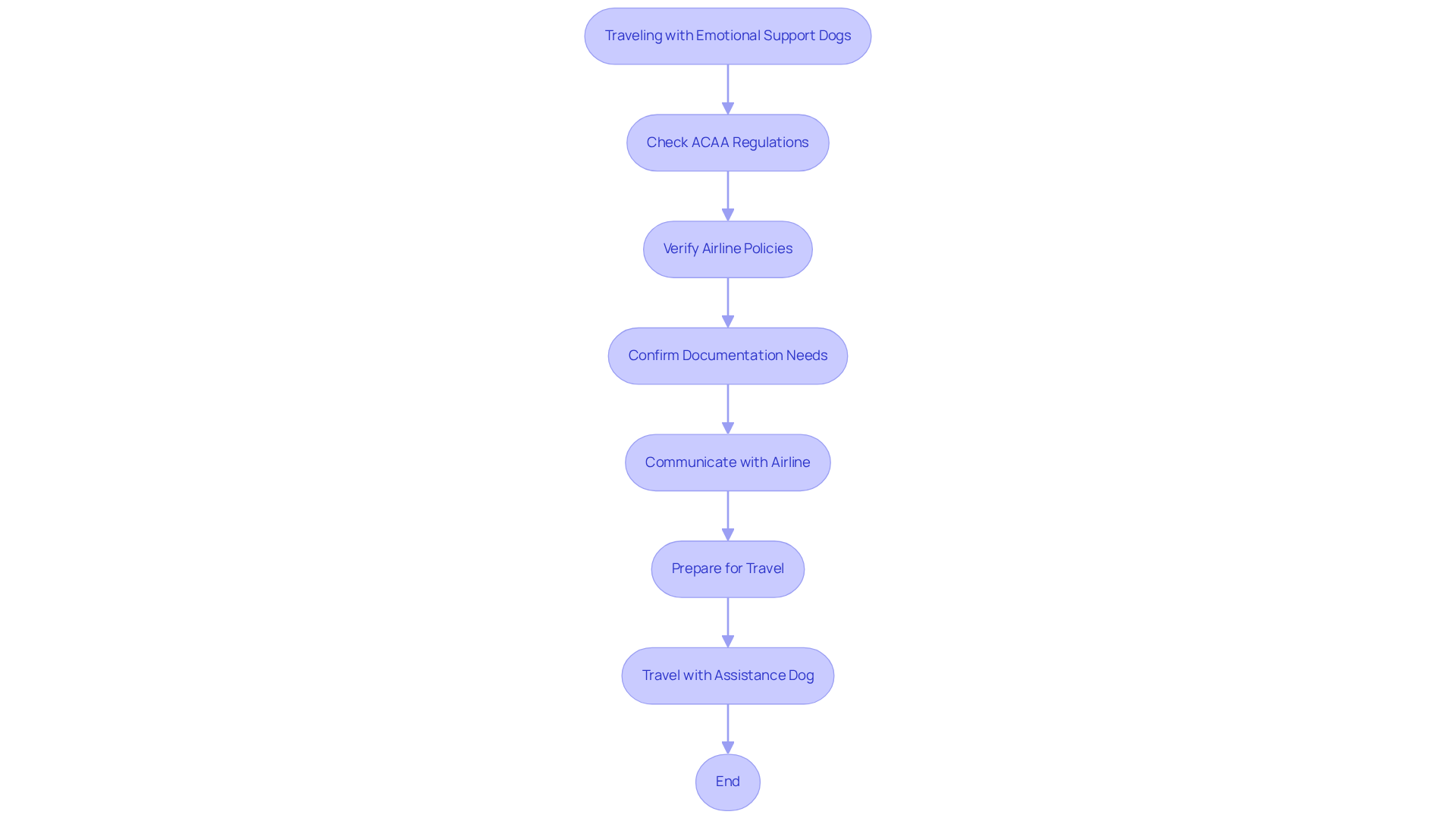
Public Spaces: Regulations for Emotional Support Dogs
Emotional assistance dogs often face challenges that differ significantly from those experienced by service animals in public spaces. While assistance dogs are granted access to all public areas, comfort dogs frequently encounter restrictions.
It’s important to recognize that approximately 60% of businesses allow therapy animals, yet regulations can vary widely. For example, some places may welcome emotional support animals (ESAs) in designated areas, which raises the question of where emotional support dogs are allowed, while others may not permit them at all. This inconsistency can create confusion for pet owners, as business owners have the authority to establish their own policies regarding ESAs.
As Allan Gates notes, the most significant challenge lies in distinguishing between service animals and comfort animals, as the latter do not perform specific tasks for individuals with disabilities. Therefore, it’s essential for ESA owners to proactively inquire about where emotional support dogs are allowed to effectively navigate public spaces and avoid potential misunderstandings.
Some businesses, including select hotels and rental properties, have embraced ESA accommodations, recognizing the vital role of emotional support for their guests. Understanding these regulations is crucial for ESA owners to advocate for their rights and ensure a smoother experience in public venues, particularly in terms of where emotional support dogs are allowed.
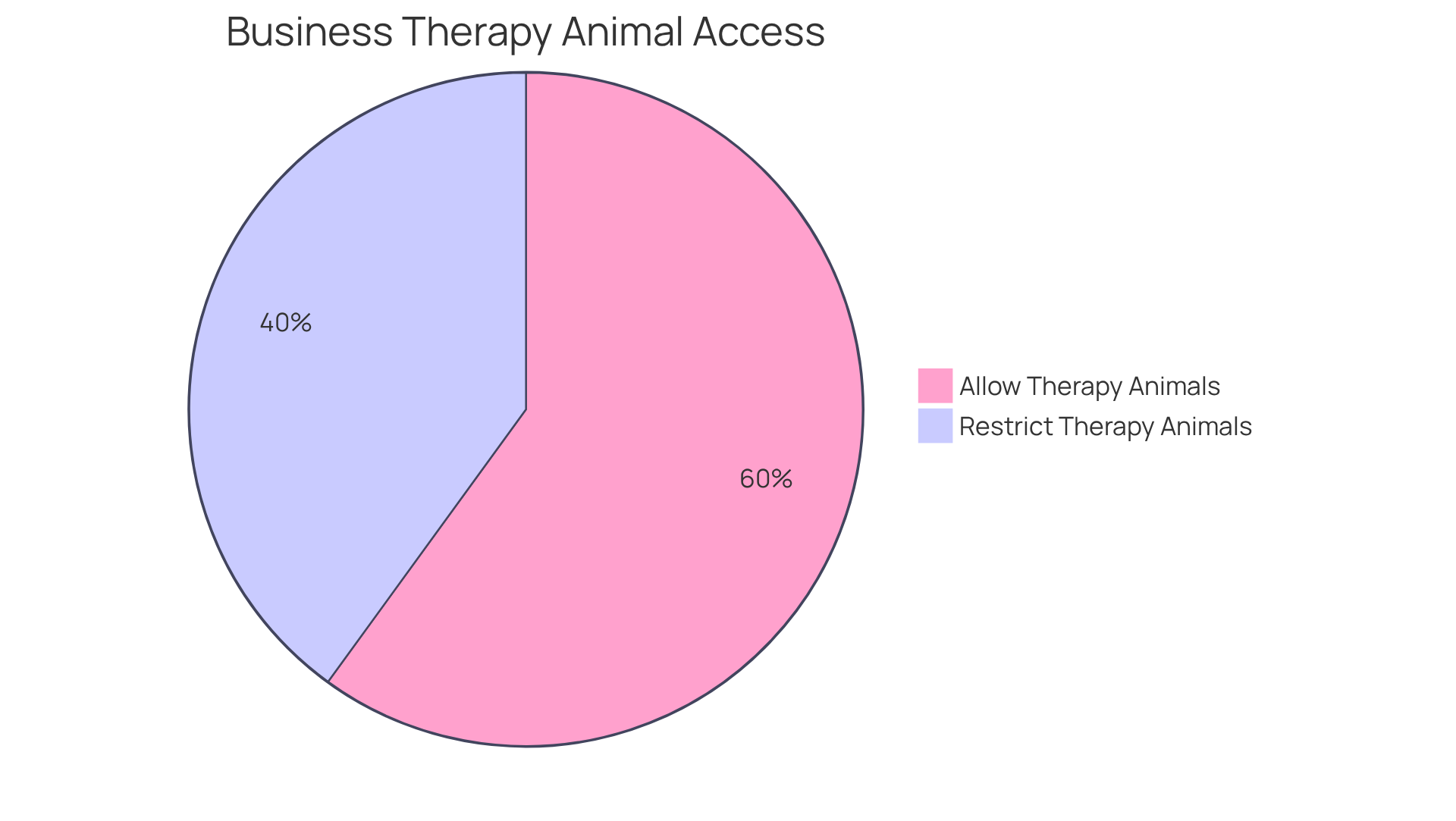
Service Animals vs. Emotional Support Dogs: Key Differences
Service creatures are specially trained to perform tasks that assist individuals with disabilities, such as guiding those who are visually impaired or alerting individuals with hearing impairments. In contrast, emotional support dogs offer comfort and companionship but do not possess the specialized training required to perform specific tasks. This distinction is essential, as it directly impacts the legal rights associated with each category of creature.
Under the Americans with Disabilities Act (ADA), service creatures enjoy broader access rights, allowing them to accompany their handlers in public spaces, including restaurants and stores. Conversely, therapy dogs are primarily protected by housing laws, like the Fair Housing Act, which allows individuals to seek reasonable adjustments in pet-restricted residences.
Additionally, airlines may permit comfort dogs to accompany their owners, although recent suggestions from the U.S. Department of Transportation could redefine service creatures, limiting them to dogs and excluding comfort creatures from the same privileges. A survey reveals that only 30% of individuals understand the difference between service creatures and comfort dogs, highlighting the urgent need for increased awareness.
Quotes from disability advocates emphasize that while service creatures are trained to perform specific functions, comfort companions play a vital role in providing reassurance. Understanding these distinctions is crucial for individuals navigating the legal framework related to service creatures and therapy dogs. Reflecting on this knowledge can empower individuals to seek the support they need, fostering a sense of understanding and compassion in their journey.
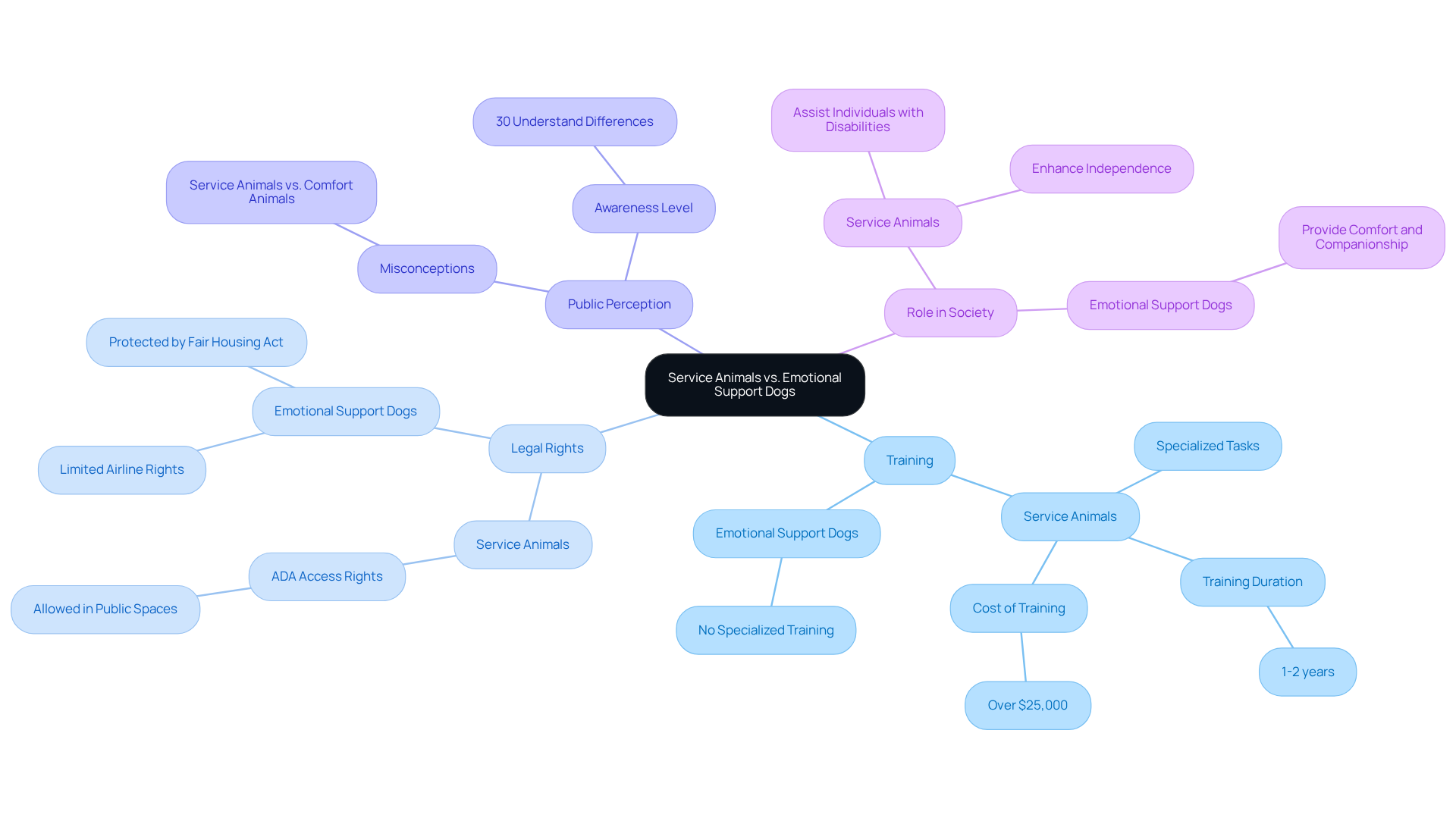
Housing Provider Guidelines: Emotional Support Dogs and Tenant Rights
Housing providers must adhere to specific regulations regarding assistance dogs, clarifying where emotional support dogs are allowed so tenants can live alongside their beloved companions without facing unnecessary barriers. Landlords are obligated to accept valid ESA letters and must understand where emotional support dogs are allowed, as they cannot impose breed or size restrictions that typically apply to pets. Alarmingly, 40% of property owners have been reported to charge fees for comfort animals, which goes against the Fair Housing Act. This important law prohibits extra charges for ESAs, recognizing their vital role in supporting the tenant’s psychological well-being, especially in areas where emotional support dogs are allowed. By understanding these guidelines, tenants can confidently advocate for their rights, knowing that landlords who violate these regulations may encounter significant penalties.
Housing advocates stress that tenants should never have to disclose the nature of their disabilities when requesting an ESA. As Logan Miller insightfully notes, ‘The Fair Housing Act mandates that landlords must accommodate assistance animals, including where emotional support dogs are allowed for psychological aid.’ This legal framework is essential for tenants who face housing challenges due to mental health conditions, including questions about where emotional support dogs are allowed.
There are numerous examples of tenants successfully overcoming obstacles with ESA letters. For example, individuals residing in pet-restricted housing have effectively used their ESA letters to secure accommodations, showcasing the importance of having proper documentation. These successes often lead to improved housing access and compliance with the law, illustrating that with the right support, tenants can navigate the complexities of housing regulations and ensure their comfort animals are welcomed in their homes.
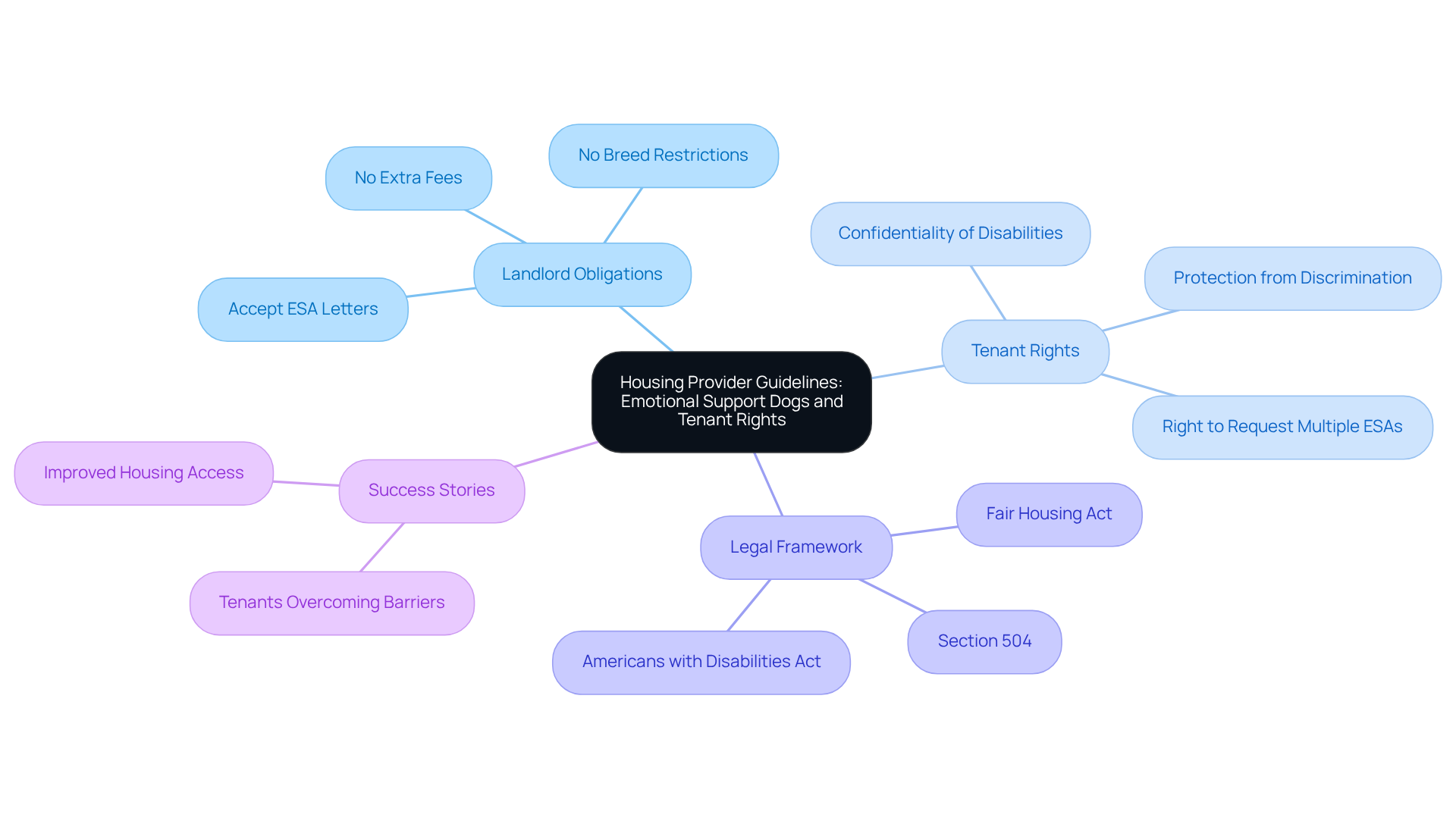
Airline Policies: What to Know About Traveling with Emotional Support Dogs
Traveling with therapy dogs can be a daunting experience, especially when navigating the complexities of airline regulations, which can vary significantly. Many airlines require advance notice and often ask for documentation, such as a valid ESA letter, to ensure a smooth journey. It’s important to recognize that around 18% of pet owners in the U.S. have emotional support animals (ESAs), and as awareness of their mental health benefits grows, so does the scrutiny surrounding ESA registrations.
As we look ahead to 2025, several airlines are implementing specific forms that must be completed before travel, alongside their policies regarding seating and accommodations for ESAs. This is particularly crucial in light of the reported 84% increase in disturbances caused by ESAs on flights between 2016 and 2018, which has led to stricter regulations. To foster a seamless travel experience, it’s always wise to consult the airline’s website or reach out to customer service for the most current information.
Travel specialists often recommend preparing early, as having the appropriate paperwork and a solid understanding of airline regulations can significantly ease the journey with your assistance pet. As travel expert Jonalyn Dionio wisely notes, “Being proactive about your ESA’s travel needs can make all the difference in ensuring a smooth experience.” With ESA registrations having surged by 50% over the past five years, it’s more essential than ever to be diligent about documentation and preparation, ensuring that you and your beloved companion can travel with confidence and care.
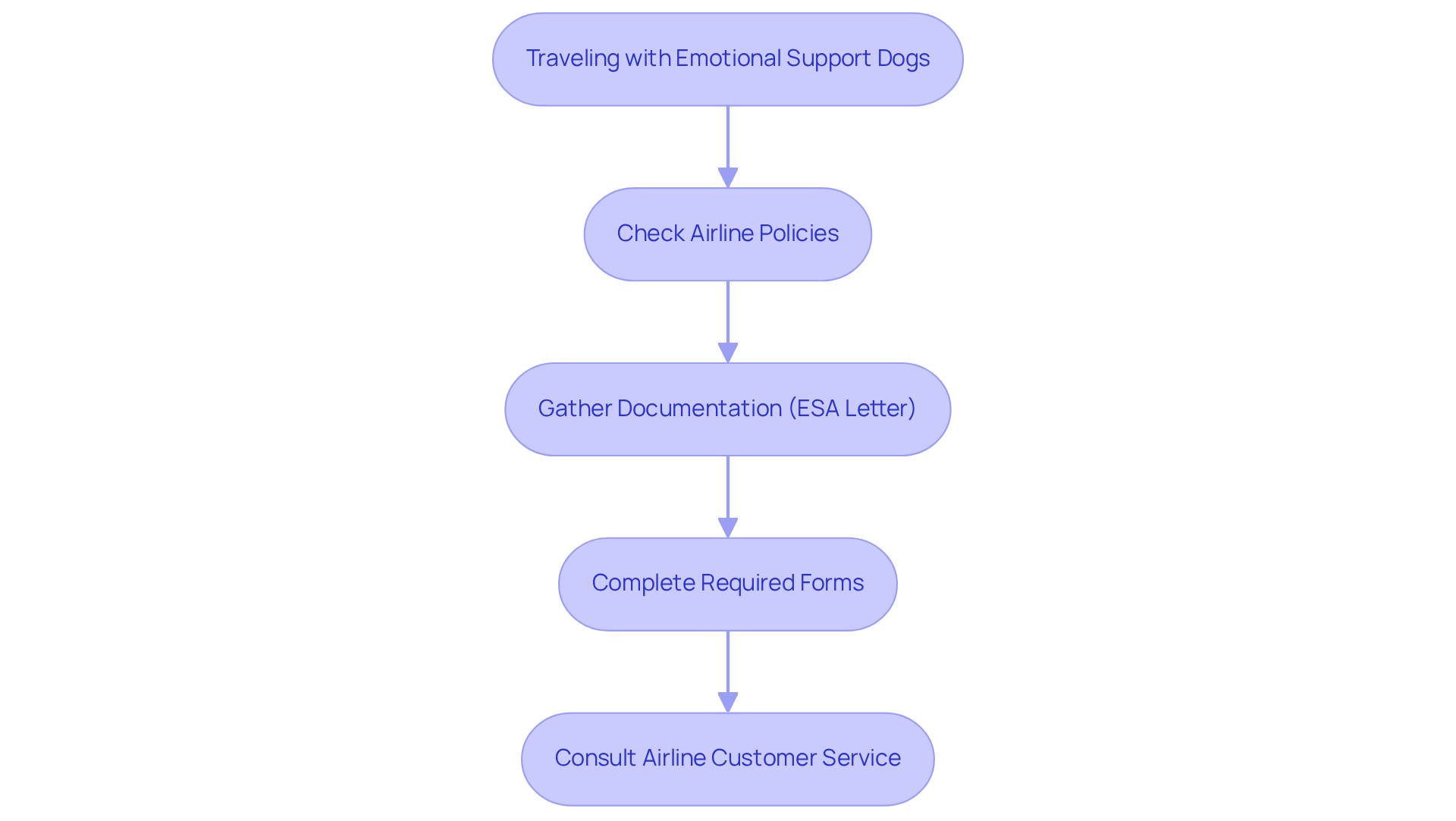
Restricted Areas: Where Emotional Support Dogs Are Not Allowed
Emotional assistance dogs face significant challenges in public spaces, particularly in locations where animals are prohibited, such as many restaurants, retail shops, and public transit systems. It’s important to recognize that approximately 90% of eateries and shops have policies that restrict assistance animals. This underscores the need for ESA owners to be well-informed about these regulations. Legal experts remind us that, although therapy animals provide essential companionship, they do not possess the same access rights as service dogs under the Americans with Disabilities Act (ADA).
As we look ahead to 2025, it’s evident that therapy dogs are typically not allowed in places with strict no-pet policies. Owners are encouraged to proactively verify the specific rules of venues they plan to visit. While some locations may graciously allow ESAs, this is not a certainty. For example, a recent incident involved an ESA owner who was turned away from a beloved café, highlighting the necessity of understanding and respecting the policies of each venue.
To navigate these obstacles, ESA owners are encouraged to have alternative plans in place, such as locating pet-friendly establishments or considering takeout options when dining out. Being aware of these restrictions not only helps prevent confrontations but also ensures adherence to local laws, allowing ESA owners to enjoy their time in public spaces without unnecessary stress.
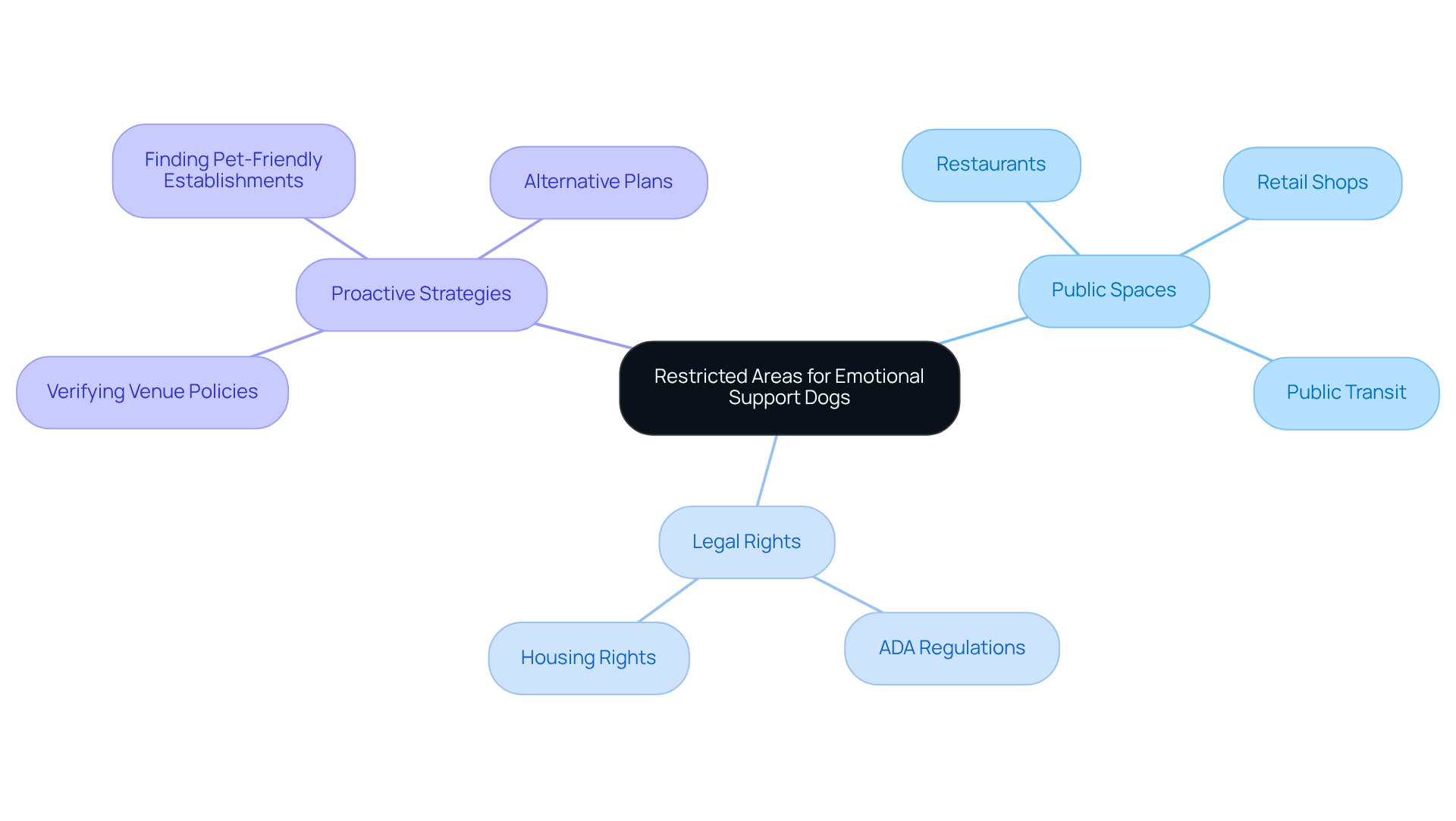
Documentation Requirements: Proving Your Emotional Support Dog’s Status
Navigating the challenges of mental health can be incredibly difficult, and for many, having an assistance dog can make a significant difference. To determine the status of an assistance dog, it’s essential for owners to provide valid documentation, typically in the form of an ESA letter issued by a licensed mental health expert. This letter outlines the owner’s mental health status and the need for their assistance animal, serving as vital evidence for housing and travel arrangements.
It’s important to note that while 32% of pet owners have their pets certified as ESAs, a staggering 70% are unaware of how to obtain this certification or mistakenly believe they don’t qualify. This highlights the crucial role that valid documentation plays in navigating housing restrictions and travel regulations. Mental health experts emphasize that possessing a current ESA letter is not just a formality; it confirms the legitimacy of the comfort animal and protects the owner’s rights under the Fair Housing Act and the Air Carrier Access Act.
Ellen Ernst, Head of Operations at Wellness Wag, shares, “The primary requirement is that the animal offers comfort and assistance to a person with a diagnosed psychological or mental disorder.” Valid ESA letters can greatly impact housing situations by enabling individuals to understand where emotional support dogs are allowed, allowing them to reside in pet-restricted accommodations and facilitating travel by exempting them from additional pet fees. For instance, a properly organized ESA letter can prevent landlords from denying housing based on “no pets” policies, ensuring that individuals receive the emotional support they need.
Moreover, clients can receive their official ESA letter within 24 hours after approval, providing timely assistance for those in need. Therefore, it is essential for ESA owners to ensure their documentation is current and compliant with legal standards, especially when considering where emotional support dogs are allowed, allowing them to focus on their well-being and the comfort provided by their assistance animal.
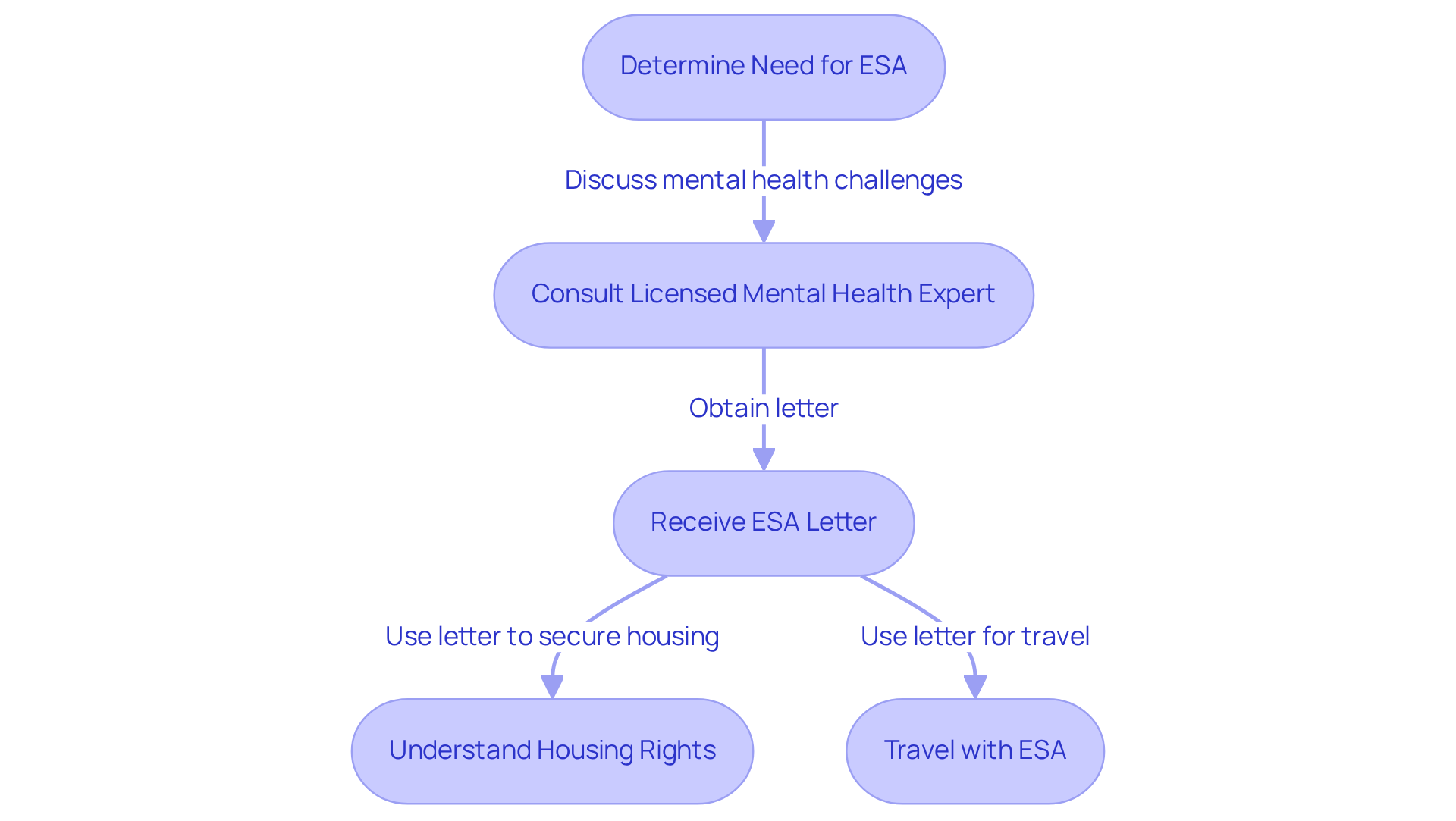
Conclusion
Understanding the rights and regulations surrounding emotional support dogs is essential for individuals seeking companionship and the broader community advocating for mental health support. Many face emotional challenges that can feel overwhelming, and having an emotional support animal can provide significant comfort. This article has explored various aspects, such as where emotional support dogs are allowed in housing, travel, and public spaces, along with the legal frameworks that protect these rights. By shedding light on the importance of valid ESA letters and the distinctions between service animals and emotional support dogs, it becomes clear that informed advocacy can greatly enhance the quality of life for those in need.
Key points discussed include the Fair Housing Act, which safeguards tenants’ rights to live with emotional support dogs in pet-restricted properties, and the Air Carrier Access Act, which outlines the requirements for traveling with these animals. It’s vital to understand the limitations of emotional support dogs in public spaces, as well as the necessary documentation to prove their status. With rising awareness about mental health benefits, the demand for emotional support animals continues to grow, emphasizing the need for education on their rights and responsibilities.
In conclusion, fostering an environment that supports emotional well-being is essential. Individuals must be proactive in understanding their rights and the regulations governing emotional support dogs. By staying informed and advocating for these rights, pet owners can ensure they and their beloved companions navigate housing, travel, and public spaces with confidence and dignity. The journey toward mental health support is made easier when individuals are equipped with the knowledge and resources to advocate for themselves and their emotional support animals. Remember, you are not alone in this journey; support is available, and understanding your rights is the first step toward a more fulfilling life.
Frequently Asked Questions
What is Wellness Wag and how does it assist with ESA letters?
Wellness Wag provides a streamlined process for obtaining Emotional Support Animal (ESA) letters, including a brief assessment for eligibility and consultations with licensed physicians. Clients receive their official ESA letter within 24 hours of approval.
Why are ESA letters important?
ESA letters are vital for individuals seeking therapeutic companionship, as they allow them to have their emotional support animals in housing and travel situations, especially in pet-restricted areas.
How quickly can clients receive their ESA letters from Wellness Wag?
Clients can receive their official ESA letter within 24 hours of approval, which is faster than the average turnaround time of 2-3 business days from other providers.
What benefits do Emotional Support Animals provide?
Research shows that spending time with an ESA can lower cortisol levels and enhance overall well-being. During the pandemic, 62% of ESA owners reported improved mental health due to their animals.
What rights do tenants have under the Fair Housing Act regarding Emotional Support Dogs?
Under the Fair Housing Act (FHA), tenants with valid ESA letters cannot be denied housing based on the presence of their assistance animals, even in pet-restricted accommodations.
What should tenants do if their ESA request is denied by a landlord?
Tenants can advocate for their rights by presenting their ESA letters and engaging in discussions with their landlords. If denied unjustly, they can file complaints with the U.S. Department of Housing and Urban Development (HUD).
What is the Air Carrier Access Act and how does it relate to traveling with ESAs?
The Air Carrier Access Act (ACAA) allows individuals with ESAs to fly on commercial airlines with a valid ESA letter. However, as of 2021, airlines are not required to accommodate therapy animals and may treat ESAs like pets, imposing standard fees.
What should travelers do before flying with an Emotional Support Dog?
Travelers should contact their airline ahead of time to confirm documentation requirements and specific policies regarding ESAs to ensure a smooth travel experience.
What challenges do individuals face when traveling with Emotional Support Dogs?
Many airlines have changed their policies regarding ESAs, often requiring specific documentation and imposing fees, which can complicate travel for individuals with assistance animals.
Certify Your Emotional Support Animal Today

Why You Can Rely on Us?
At Wellness Wag, we believe your pet deserves care rooted in both science and compassion. Each article is carefully researched, written in clear language for pet owners, and then reviewed by qualified professionals to ensure the information is evidence-based, current, and practical for real-life care. Our goal is to help you feel confident in making informed decisions about your pet’s health and well-being.
Reviewed by
Angela Morris, MSW, LCSW
Angela is a licensed clinical social worker with 20 years of experience in patient advocacy and community mental health. She has assisted numerous clients with ESA evaluations and brings a deep understanding of disability accommodations, ensuring that all information is accurate, supportive, and practical.

Written by :
Lena Park
Last Updated :
August 3, 2025












